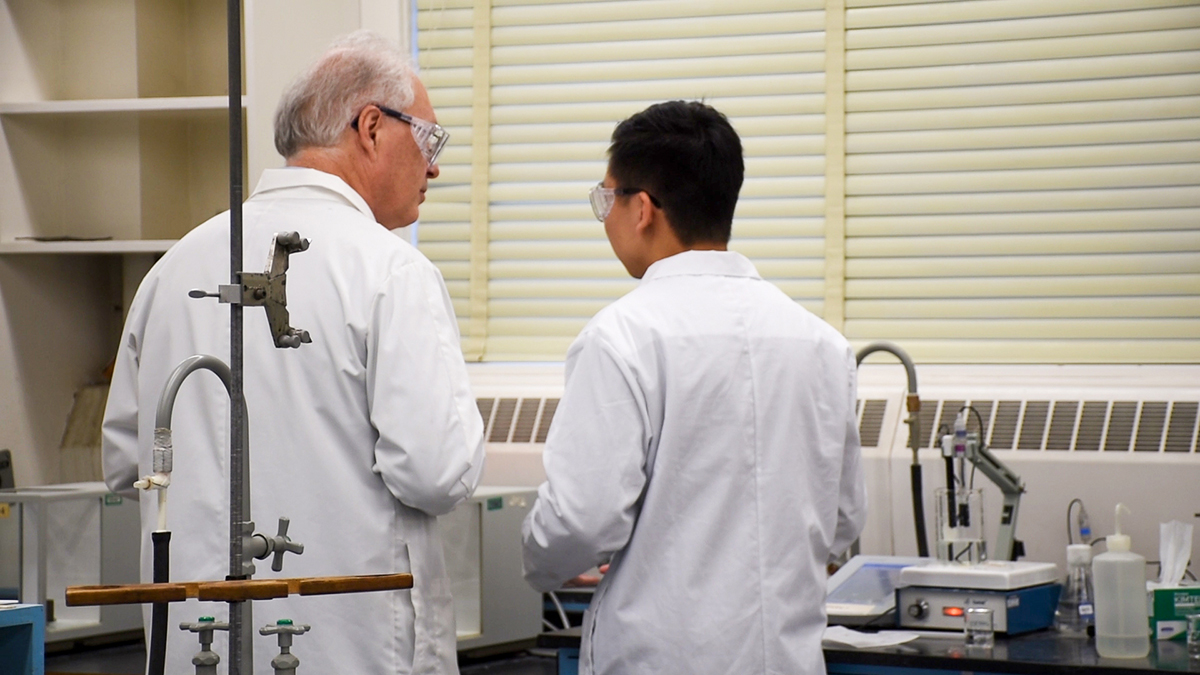Empathy and Experience for Long-term Learning with Dr. Charles Lucy
Dr. Charles Lucy cares about his students' futures. Teaching with empathy, encouraging experiential learning opportunities, and leveraging his curricular choices, Dr. Lucy aims to facilitate learning with lasting value for his Chemistry students.
"If you care about the students, that helps them care about what you're teaching."
-Chuck Lucy
Teaching Philosophy Statement
I feel privileged to have the opportunity to teach and to share my passion for my subject with students. But I am also an active scholar which limits the time that I can devote to my students. So, I have to be analytical and efficient in my teaching. Weighing each initiative and activity in terms of pedagogical benefit for the student versus the time and energy required of me. And then relish the time I get to spend with students.
In lecture the pedagogical benefit starts with reminding students of the simple truth that learning is fun! We each grew up with the ballads of our discipline - of the great scientists and philosophers, of the threshold ideas that change the way the subject is viewed for all time. But if we aren't careful, any subject can bog down into details and minutiae that we only teach because we can test it reproducibly - the tyranny of the test. I would rather focus on topics and activities that, while harder and less precise to mark, result in deeper and more lasting understanding.
Learning should be an open and interactive activity, one that can leave the learner vulnerable. Thus the learning environment must be welcoming and relaxed. Cartoons, humour and demos help me establish this environment, by showing my own enjoyment of the material. Teaching must be responsive to the needs of students. But I must be efficient with my time. I have found, spamming, where my answer to an anonymized e-mail question goes to all students, allows me to address student difficulties in a timely fashion, while keeping me abreast of bottlenecks in understanding that should be addressed in future class discussions.

Repetition and diverse approaches are necessary to develop understanding. Use of in-class activities, demos and humour related to the topic make this reflection fun, while the open interaction enables me to adapt and revise the repetition to the needs of the students.
The courses I teach are required courses for numerous non-chemistry programs. Thus it is critical that students see its relevance to their experiences and ambitions. The instructor must be credible with clear expertise in the field and a clearly articulated awareness of the needs of the students. The instructor not only needs to know the material being taught, but also needs to know what that course's role is in the students' various programs and how it relates to their subsequent careers. By demonstrating that I care about their long-term success, my students are more willing to trust me when I say a particularly tedious or challenging task is important, and they will strive to master it.
Learning should never start or stop with a course, or even a degree. Opportunities for learning are everywhere. Thus, I share with students upcoming seminars, events and opportunities on campus. Experiential learning is an invaluable means to achieve the Gladwellian 10,000 repetitions needed for mastery, and for a student to discover their own passion.
"We often ask why it's important for students to get experiential learning. And the main reason is it helps put things in context for the students. They get a chance to see how what they're learning in lecture and lab translates to what their own career will be. They also get a chance to find out if they like that career."
-Chuck Lucy
About Dr. Charles Lucy
Dr. Charles (Chuck) Lucy is a Professor Emeritus at the University of Alberta. He has co-authored over 160 research papers, and received two national awards for his research. Chuck is also a passionate teacher who has taught a range of classes from 400+ freshman students to discovery-based graduate lectures. He was involved in the development of a second-year research program and a course about careers in chemistry. But his primary teaching has been introductory analytical chemistry. He is a contributing author to Daniel Harris's Quantitative Chemical Analysis, the most popular textbook in the field. Chuck was also a member of the Provost's Digital Learning Committee which established a funding program for blended learning pilots at the University of Alberta.
Chuck has organized many W.E. Harris Teaching Workshops that bring instructors from across western Canada together to discuss the teaching of chemistry, and many national and international chemistry education symposia.
Awards
Chemical Institute of Canada's Award for Chemistry Education Rutherford Award for Excellence in Undergraduate Teaching 3M National Teaching Fellow Faculty of Science Teaching Innovation Award Instructor of the Month (September 2016)